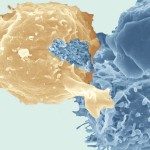Lien vers Pubmed [PMID] – 35104884
Lien DOI – gfac01610.1093/ndt/gfac016
Nephrol Dial Transplant 2022 Feb; ():
Patients on maintenance hemodialysis have an increased risk of severe COVID-19 and a reduced response to vaccines. Data are needed to identify immune correlates of protection in this population.Following a COVID-19 outbreak among vaccinated patients in a hemodialysis unit, clinical data and serological response to BNT162b2 vaccine were retrospectively recorded.Among fifty-three patients present in the dialysis room, fourteen were infected by SARS-CoV-2 alpha variant (COVID_Pos) and 39 were not. In comparison to uninfected patients, COVID_Pos patients more frequently had additional causes of immunosuppression (50% vs 21%, p = 0.046), and were more often scheduled on the Monday-Wednesday-Friday (MWF) shift (86% vs 39%, p = 0.002). Moreover, COVID_pos had lower anti-Spike IgG titers than uninfected patients (24 BAU/ml [3-1163] vs 435 BAU/mL [99-2555], p = 0.001) and lower neutralization titers (108 [17-224] vs 2483 [481-43 908], p = 0.007). Anti-Spike and neutralization antibody titers are correlated (r = 0.92, p < 0.001). In multivariable analysis, MWF schedule (OR = 10.74 (1.9-93.5), p = 0.014) and anti-spike IgG titers one month before the outbreak (<205 BAU/ml: OR = 0.046 (0.002-0.29), p = 0.006) were independently associated with COVID-19 infection. None of the patients with anti-Spike IgG above 284 BAU/mL got infected. Ten out of fourteen COVID_Pos patients were treated with Casirivimab and Imdevimab. No patient developed severe disease.Anti-spike IgG titer measured prior to exposure correlates to protection from SARS-CoV-2 infection in hemodialysis patients. BNT162b2 vaccination alone or in combination with monoclonal antibodies prevented severe COVID-19.


